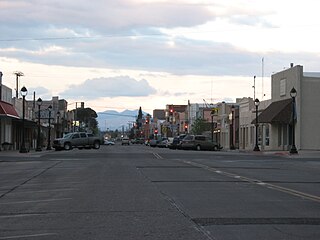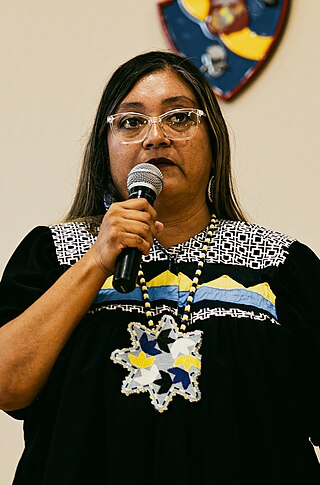Related Research Articles

Peridot is an unincorporated community and census-designated place (CDP) in Gila and Graham counties in the U.S. state of Arizona. The population was 1,350 at the 2010 census.

Safford is a city in Graham County, Arizona, United States. According to the 2020 Census, the population of the city is 10,129. The city is the county seat of Graham County.
The Apache are several Southern Athabaskan language–speaking peoples of the Southwest, the Southern Plains and Northern Mexico. They are linguistically related to the Navajo. They migrated from the Athabascan homelands in the north into the Southwest between 1000 and 1500 CE.

The Western Apache are a subgroup of the Apache Native American people, who live primarily in east central Arizona, in the United States and north of Mexico in the states of Sonora and Chihuahua. Most live within reservations. The Fort Apache Indian Reservation, San Carlos Apache Indian Reservation, Yavapai-Apache Nation, Tonto Apache, and the Fort McDowell Yavapai Nation are home to the majority of Western Apache and are the bases of their federally recognized tribes. In addition, there are numerous bands. The Western Apache bands call themselves Ndee (Indé). Because of dialectical differences, the Pinaleño/Pinal and Arivaipa/Aravaipa bands of the San Carlos Apache pronounce the word as Innee or Nnēē:.

Jicarilla Apache, one of several loosely organized autonomous bands of the Eastern Apache, refers to the members of the Jicarilla Apache Nation currently living in New Mexico and speaking a Southern Athabaskan language. The term jicarilla comes from Mexican Spanish meaning "little basket", referring to the small sealed baskets they used as drinking vessels. To neighboring Apache bands, such as the Mescalero and Lipan, they were known as Kinya-Inde.

The Yavapai–Apache Nation is a federally recognized Native American tribe of Yavapai people in the Verde Valley of Arizona. Tribal members share two culturally distinct backgrounds and speak two Indigenous languages, the Yavapai language and the Western Apache language.

The Tonto Apache Tribe of Arizona or Tonto Apache is a federally recognized tribe of Western Apache people located in northwestern Gila County, Arizona. The term "Tonto" is also used for their dialect, one of the three dialects of the Western Apache language, a member of Southern Athabaskan language family. The Tonto Apache Reservation is the smallest land base reservation in the state of Arizona.

The San Carlos Apache Indian Reservation, in southeastern Arizona, United States, was established in 1872 as a reservation for the Chiricahua Apache tribe as well as surrounding Yavapai and Apache bands removed from their original homelands under a strategy devised by General George Crook of setting the various Apache tribes against one another. Once nicknamed "Hell's Forty Acres" during the late 19th century due to poor health and environmental conditions, modern San Carlos Apaches operate a Chamber of Commerce, the Apache Gold and Apache Sky Casinos, a Language Preservation program, a Culture Center, and a Tribal College.

San Carlos Lake was formed by the construction of the Coolidge Dam and is rimmed by 158 miles (254 km) of shoreline. The lake is located within the 3,000-square-mile (7,800 km2) San Carlos Apache Indian Reservation, and is thus subject to tribal regulations.

The Coolidge Dam is a reinforced concrete multiple dome and buttress dam 31 miles (50 km) southeast of Globe, Arizona on the Gila River. Built between 1924 and 1928, the Coolidge Dam was part of the San Carlos Irrigation Project. Coolidge Dam was named after the 30th US president, Calvin Coolidge and was dedicated by President Coolidge on March 4, 1930. The design and construction engineer was Herman Neuffer, who oversaw much of the construction undertaken by the Bureau of Indian Affairs (BIA) during the 1920s in Arizona and New Mexico.

Peterson Zah was an American politician who held several offices with the Navajo Nation. From 1983 to 1987, he was chairman of the Navajo Nation, its then head of government. At its 1991 restructuring, he became the first president of the Navajo Nation, until 1995. He then worked at Arizona State University as special adviser to the president on American Indian Affairs from 1995 to 2011 and consulted companies willing to work with his nation.

The Yavapai are a Native American tribe in Arizona. Their Yavapai language belongs to the Upland Yuman branch of the proposed Hokan language family.
The Fort Sill Apache Tribe of Oklahoma is the federally recognized Native American tribe of Chiricahua Warm Springs Apache in Oklahoma.
San Marcos Unified School District (SMUSD) is a public school district based in San Marcos, California. It includes 19 schools with educational programs for kindergarten through adult education students. The district serves San Marcos, as well as sections of Vista, Escondido, Carlsbad, and some unincorporated areas of the county. SMUSD is the fifth largest school district in San Diego County, serving over 19,000 students.
The Lipan Apache Tribe of Texas is a state-recognized tribe and nonprofit organization in Texas. Members of the tribe descend from the Lipan Apache, a Southern Athabaskan Indigenous people. The Lipan Apache Tribe of Texas is headquartered in McAllen, Texas.

Oak Flat is in Pinal County about 40 miles (64 km) east of Phoenix in the Tonto National Forest, a high desert setting at 3,900 feet (1,200 m) elevation. The land is sacred to Native Americans from the San Carlos Apache Indian Reservation and many other Arizona tribes. This federally-protected area is listed on the National Register of Historic Places, and features a National Forest Service public campground. The landscape includes Apache Leap cliff, the mesa of Oak Flat, and Devil's Canyon, all of which have long been popular with hikers, birders, climbers, off-roaders, hunters, and members of the area's indigenous tribes. Oak Flat has been subject to attempts by the federal government to sell it to mining interests since 2002, against the wishes of the San Carlos Apache tribe.
Maria Hernandez Ferrier is a former government official and the first president of Texas A&M University–San Antonio from 2010-2014. After working as an unlicensed nurse's assistant for minimum wage, Ferrier attended her first community college class at age 30, and she has received a doctorate from Texas A&M University and other degrees from Our Lady of the Lake University. In 1992 and 2002, she was named as the director of the Office of English Language Acquisition, Language Enhancement and Academic Achievement for Limited English Proficient Students (OELA) separately under Presidents George H. W. Bush and George W. Bush; in this position, she served as the main advisor to the United States Secretary of Education for all matters related to students who speak limited-proficiency English.
Rebecca Tsosie is an American jurist of Yaqui descent, specializing in Indian law, Indigenous sovereignty, and environmental justice. She became the Regents Professor and Morris K. Udall Professor of Law at the University of Arizona in 2022. Tsosie has served as an associate justice on the Fort McDowell Yavapai Nation Supreme Court since 2008. She was a judge on the San Carlos Apache Court of Appeals from 2007 to 2024.
Barbara May is an Apache politician and social worker serving as a member of the San Carlos Apache Tribal Council for the Gilson Wash district since November 2020. Her career in public service has primarily focused on social services, with over 30 years of experience in the field.

Valerie Key-Cheney is an Apache politician serving as a member of the San Carlos Apache Tribal Council for the Peridot district since 2018.
References
- 1 2 3 4 5 6 7 8 9 10 11 "Ina Salter". www.scat-nsn.gov. Retrieved 2024-09-22.
- ↑ Rambler, Terry (2022). "For the 2022 Graduates – Education is Now More Important than Ever" (PDF). SCATch UP. Retrieved 2024-09-22.
- ↑ "SCAT Chairman Rambler wins historic, unprecedented fourth consecutive term". The Gila Herald. 2022-11-10. Retrieved 2024-09-22.